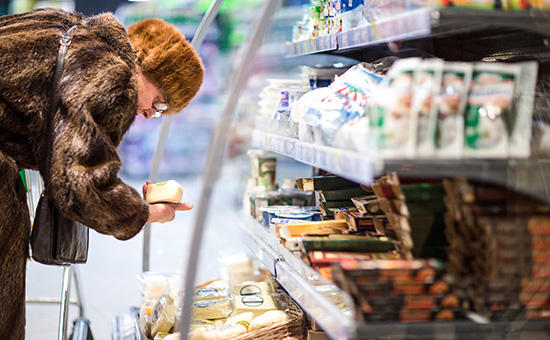
Photo: Fotobank / Getty Images
Less than a month and a half since the beginning of 2015, consumer prices in Russia increased by 4.8%, according to Rosstat. So quickly they did not rise since 1999. For comparison, in the “pre-crisis” in 2013 to ensure that closer to the current level of inflation, it took more than nine months – by the end of September 2013 it was only 4,63%.
From 3 to 9 February this , consumer prices in Russia increased by 0.6% in the first nine days of February – by 0.9%. Given the fact that by 10 February 2014 they grew by only 0.3%, which means that annual inflation in Russia is at 15% in January, rose to about 15.6%. This is higher than the plan for 2015 (according to the Ministry of Economic Development, for the year prices are expected to grow by about 12%), and the key rate of the Central Bank (15%).
Of the products from 3 to 9 February fastest to go up some vegetables and fruits. Prices of carrots and onions immediately jumped 3.1%, cucumbers rose 2.2%, cabbage – by 1.7%, apples – by 1.2%. The average increase in prices for fruits and vegetables in the first full week of February amounted to 1,5%.
Of the remaining products by more than 1% rose rice (+ 2.3%), frozen fish (1 , 9%), sunflower oil (1.5%) and curd (+ 1.1%). Going up rapidly in the past year buckwheat rose in price by 0.3%, and even pork fell – on average the same 0,3%.
February 9, 2015 Economic Development Minister Alexei Ulyukayev said that the peak of inflation in Russia in 2015 will be in March-April and will be from 15 to 17%. However, in the future, in accordance with the macroeconomic forecast of the Ministry, prices should start to fall, so that by the end of the year inflation will fall to around 12%.
The expert, however, in such a scenario is not too believe. “To return it [inflation] is 12%, you will greatly slow down the rise in prices in the remaining months, and a decrease in the key rate is not conducive to this. I would expect inflation peak around May – about 20%, “- said RBC Associate Professor of Finance at NES Oleg Shibanov.
On the eve of Finance Minister Anton Siluanov, in order not to increase inflationary pressures, proposed to miss the next indexation of social payments and salaries of civil servants. “In the current environment would be to miss the indexation of salaries as civil servants and other categories of citizens, and social benefits to ease the budget of the current and subsequent years, do not stimulate consumption, the additional demand, including imported goods,” – said the Minister .
Earlier, the Central Bank, explaining his decision to reduce the key rate from 17 to 15%, said that inflationary pressures will be restrained by a decrease in economic activity. “The decline in real wages and a slowdown in retail lending led to a reduction in consumer activity … Slower growth in consumer prices will contribute to low aggregate demand while maintaining the total output of goods and services below potential, as well as a moderately strict policy of budget expenses,” – noted in the message Central Bank.
According to experts of the Central Bank, the annual inflation rate to fall below 10% in January 2016.
No comments:
Post a Comment